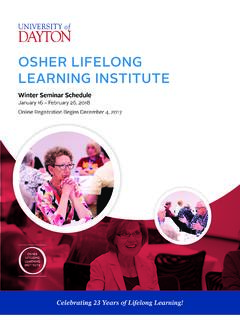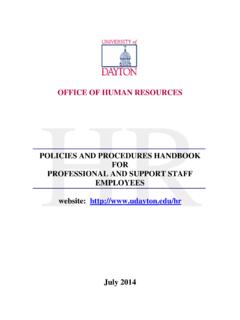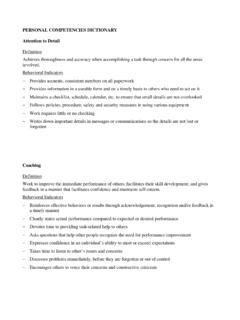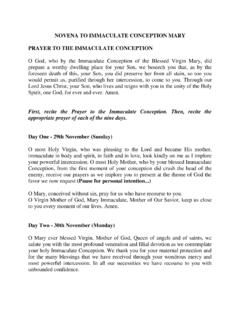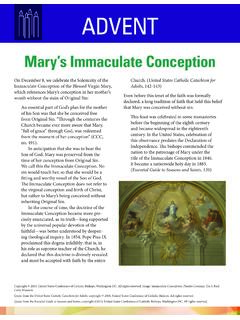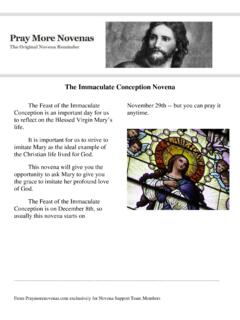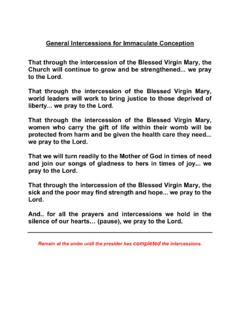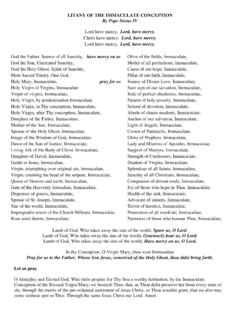Transcription of THE IMMACULATE CONCEPTION - University of Dayton
1 THE IMMACULATE CONCEPTION On December 8, 1854, Pope Pius IX, in the bull Ineffablis Deus, proclaimed: We declare, pronounce and define that the doctrine which holds that the Blessed Virgin Mary, at the first instant of her CONCEPTION , by a singular privilege and grace of the Omnipotent God, in virtue of the merits of Jesus Christ, the Savior of mankind, was preserved IMMACULATE from all stain of original sin, has been revealed by God, and therefore should firmly and constantly be believed by all the The title Ineffabilis Deus, or Ineffable God, emphasizes that the preservation of Mary from sin, including Original Sin, is a gift, given by the Omnipotent God. This extraordinary grace is given, as is all grace, through the merits of Jesus Christ, the Saviour of all, although, in Mary s case, grace was given in view of the future death and Resurrection of Jesus.
2 Each of us has experienced the different ways that God has acted to preserve us from sin. We experience our flaws and weakness. As our self-awareness grows, we recognize deep wells of resistance to God as well as our own deeply-entrenched self-centeredness. In different circumstances and deprived of the supports we have had and the graces that we have received, these deep-rooted tendencies could cut us off from God. God s love has not only brought healing to our sins in the past but has protected us from our own capacity for sin, pulling us out of our sins and turning us from other sins. This has been the grace of the Holy Spirit, given us by the Father through the merits of Jesus. Such grace was given to Mary from the first moment of her CONCEPTION . The Second Vatican Council speaks of Mary as all holy and free from every stain of sin, as though fashioned by the Holy Spirit and formed as a new creature.
3 2 Paul VI speaks of the sanctifying intervention of the Holy Spirit in the life of the 3 He recalls that the Fathers spoke of the Holy Spirit as a spring that flowed upon Mary giving her the fullness of grace and abundant spiritual 1 Pius IX, Ineffabilis Deus, quoted by Rene Laurentin, "The Role of the Papal Magisterium in the Development of the Dogma of the IMMACULATE CONCEPTION ," trans by Charles Sheedy, and Edward Shea, , in Edward O'Connor, The Dogma of the IMMACULATE CONCEPTION : History and Significance (South Bend: University of Notre Dame Press, 1958), 312. 2 Second Vatican Council, Lumen Gentium, 56. 3 Paul VI, Marialis Cultis, 26. 2gifts, so that she is a temple of the Holy Spirit. 4 John Paul II also attributes her holiness to the Spirit.
4 Together with the Father, the Son has chosen her, entrusting her eternally to the Spirit of holiness. 5 For us, as well, being open to the Spirit enables us to be fashioned by the Spirit of holiness in order to receive the graces that God wants to pour upon us. Radically redeemed that she would be a worthy mother: The understanding of the grace given to Mary developed slowly in the Church. While the apocryphal Protoevangelium of James, composed in the mid-second century, is replete with imaginative ideas, yet it witnesses for us the belief present in parts of the church of Mary s purity and holiness. St. Augustine (d. 431) is a witness to the fact that at least in parts of the Church, there was an instinct that the mother of God s Son received unique graces. Pelagius (d. after 418), a Welsh monk, taught that human beings had the power to keep the commandments and to avoid sin.
5 In reply, Augustine insisted that every person is a sinner and needs the grace of God. Yet he made an exception of Mary: We must except the holy Virgin Mary, concerning whom I wish to raise no question when it touches the subject of sin, out of honor to the Lord; for from Him we know what abundance of grace for overcoming sin in every particular was conferred upon her who had the merit to conceive and bear Him who undoubtedly had no We can recognize gift elements in Augustine s words. Mary has overcome sin. This was a gift, given to her. She was given an abundance of grace from Christ. This gift was given to her by God in view of her special vocation, who had the merit to conceive and bear Him who undoubtedly had no sin. Although Augustine does not refer to original sin, his opinion on its universality makes it seem likely that Augustine is only speaking about personal sin The meaning of original sin: Underlying the discussion of the IMMACULATE CONCEPTION there has been a lack of clarity about the meaning of original sin.
6 The key text of the Council of 4 Paul VI, Marialis Cultis, 26. 5 John Paul II, Redemptoris Mater, 8. 6 Augustine, On Nature and Grace, (De Natura et Gratia), 42 (36), in Nicene and Post-Nicene Fathers, V, ed. Philip Schaff (Grand Rapids: Wm. B. Eerdmans Publ. Co, 1980), 135. 7 Luigi Gambero, Mary and the Fathers of the Church, trans. Thomas Buffer (San Francisco: Ignatius Press, 1999), 226. 3 Trent affirmed that, by his sin, Adam, lost that holiness and justice in which he had been 8 The Council states that Adam was stained by the sin of 9 and bears the guilt of original sin. 10 Is the stain or the guilt to be understood as a thing? For Augustine and Thomas, sin and evil are not things but the lack of something that should be present in a thing.
7 The Catechism of the Catholic Church speaks of original sin, as Trent did, as a loss, It is a deprivation of original holiness and justice. 11 The Catechism affirms that this sin is transmitted by transmission of human nature deprived of original holiness and justice. 12 The Catechism describes the holiness as grace, the grace of original holiness. 13 The loss of original justice results in the lack of harmony of the soul over the body, a lack of harmony between men and women, and a lack of harmony with creation Karl Rahner maintains that original sin is not the presence of some thing but an absence: [original sin] consists precisely in the lack of grace. 14 Thus, Mary had sanctifying grace from the first instant of her existence. 15 John Macquarrie, an Anglican theologian, argues that describing Mary as without sin is one aspect and a negative one.
8 A more affirmative expression would be to say that she was always the recipient of grace, being always surrounded by grace even in her CONCEPTION in the love of her In a similar way, Mary: Grace and Hope in Christ, the statement of the Anglican-Roman Catholic International Commission (Feb 2, 2005) , points out 8 Council of Trent, Session 5, 1, Decrees of the Ecumenicla Councils, vol. II, ed. Norman P. Tanner, (London:Sheed & Ward, 1990) 666 9 Council of Trent, Session 5, 2, Decrees of the Ecumenicla Councils, vol. II, ed. Norman P. Tanner, (London:Sheed & Ward, 1990) 666. 10 Council of Trent, Session 5, 5, Decrees of the Ecumenicla Councils, vol. II, ed. Norman P. Tanner, (London:Sheed & Ward, 1990) 667. 11 Catechism of the Catholic Church (Second Edition), 405, (Rome: Libreria Editrice Vaticana, 2010), 102.
9 12 Catechism of the Catholic Church (Second Edition), 404, (Rome: Libreria Editrice Vaticana, 2010), 102. 13 Catechism of the Catholic Church (Second Edition), 399, (Rome: Libreria Editrice Vaticana, 2010), 100. 14 Karl Rahner, Mary Mother of the Lord, trans. W. J. O Hara (London: Catholic Book Club, 1963), 43-44. 15 Karl Rahner, Mary Mother of the Lord, trans. W. J. O Hara (London: Catholic Book Club, 1963), 43-44. 16 John Macquarrie, Mary for All Christians (Grand Rapids: William B. Eerdmans, 1990), 71-72. 4that rather than focusing only on sinlessness, we should also acknowledge that the glorious grace of God filled Mary s life from the beginning. 17 Mary gives us hope that this unmerited grace may be ours. Rahner asserts that Mary was enveloped from the beginning of her life in the redemptive and saving love of God.
10 18 Not only was she redeemed, but, Rahner insists, she was redeemed radically. 19 Mary is not different from us because of these great gifts since we also will be wrapped in the redeeming and saving love of God. The difference is, as Rahner states, that she possessed these gifts, from the beginning, and incomparably. 20 Likewise, Edward Schillebeeckx, , asserts that, rather than not needing Jesus saving death, Mary s experience of God s mercy and redemption is greater and more profound and far-reaching than ours. 21 Such grace allowed Mary to cooperate in her own redemption, with a holiness that was, a pure receptivity and openness towards God's potential gifts. 22 Being exempt from original sin did not include exemption from the normal course of growth and mistakes not of a moral nature. She also was subject to spiritual progress.


